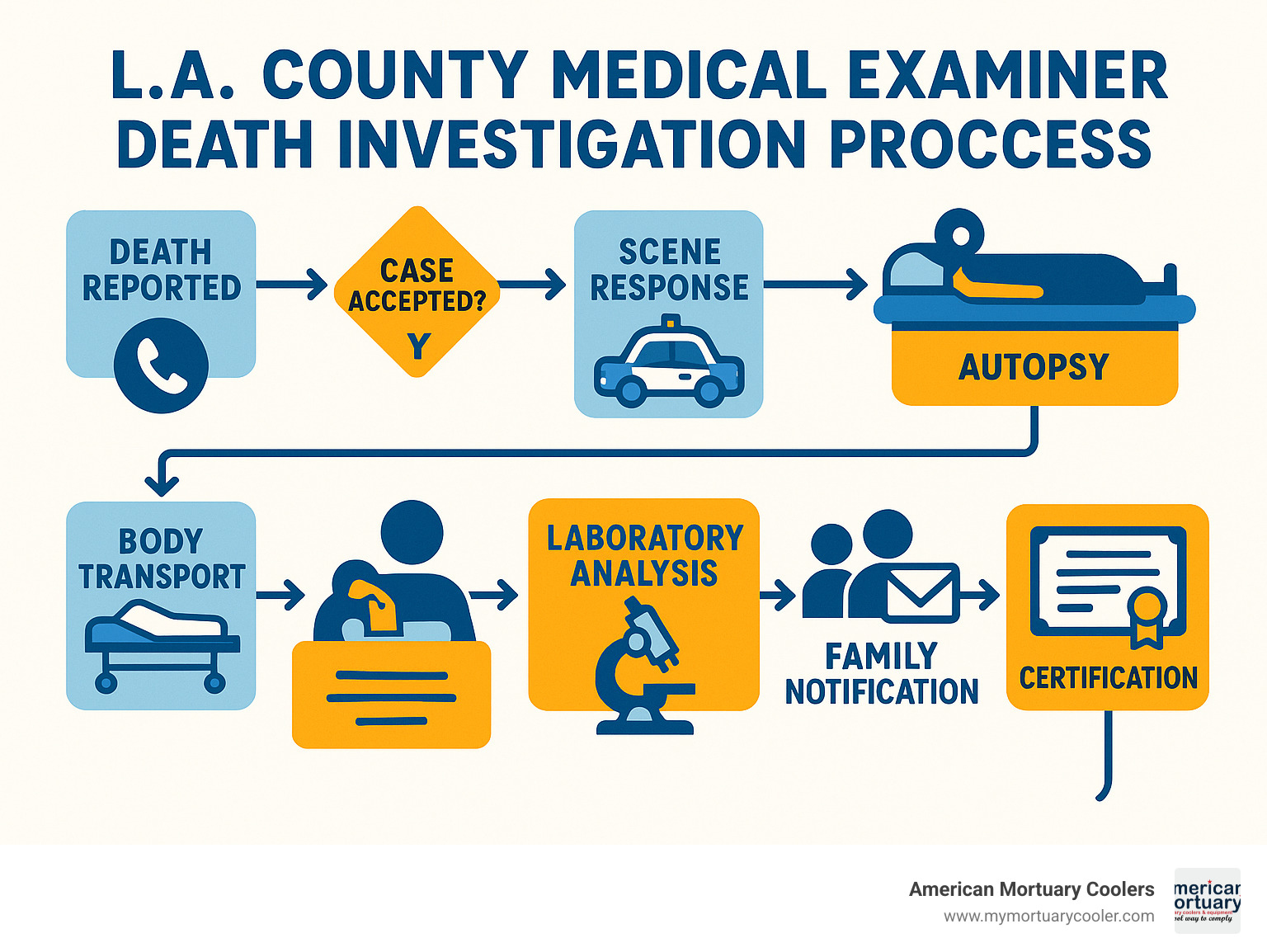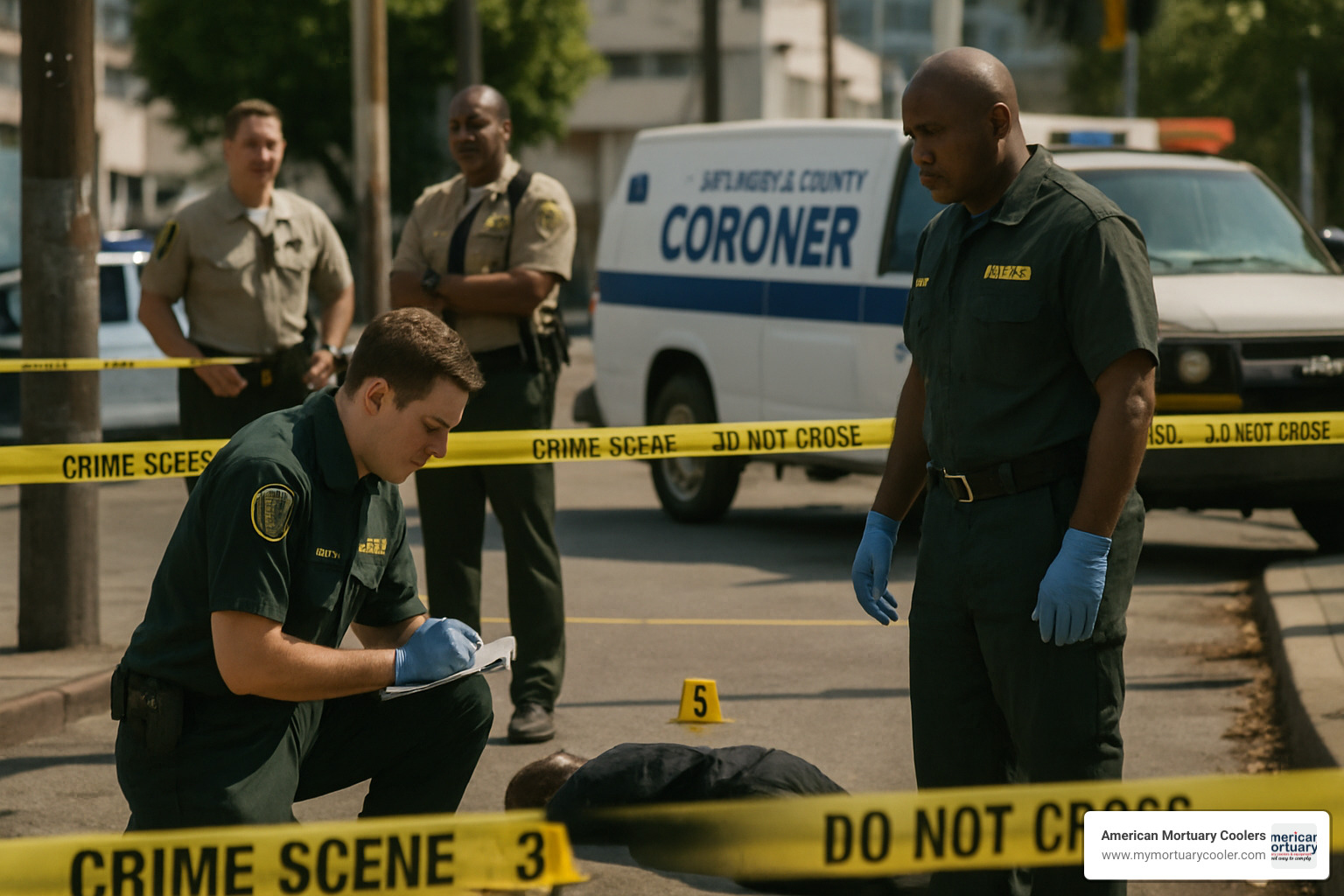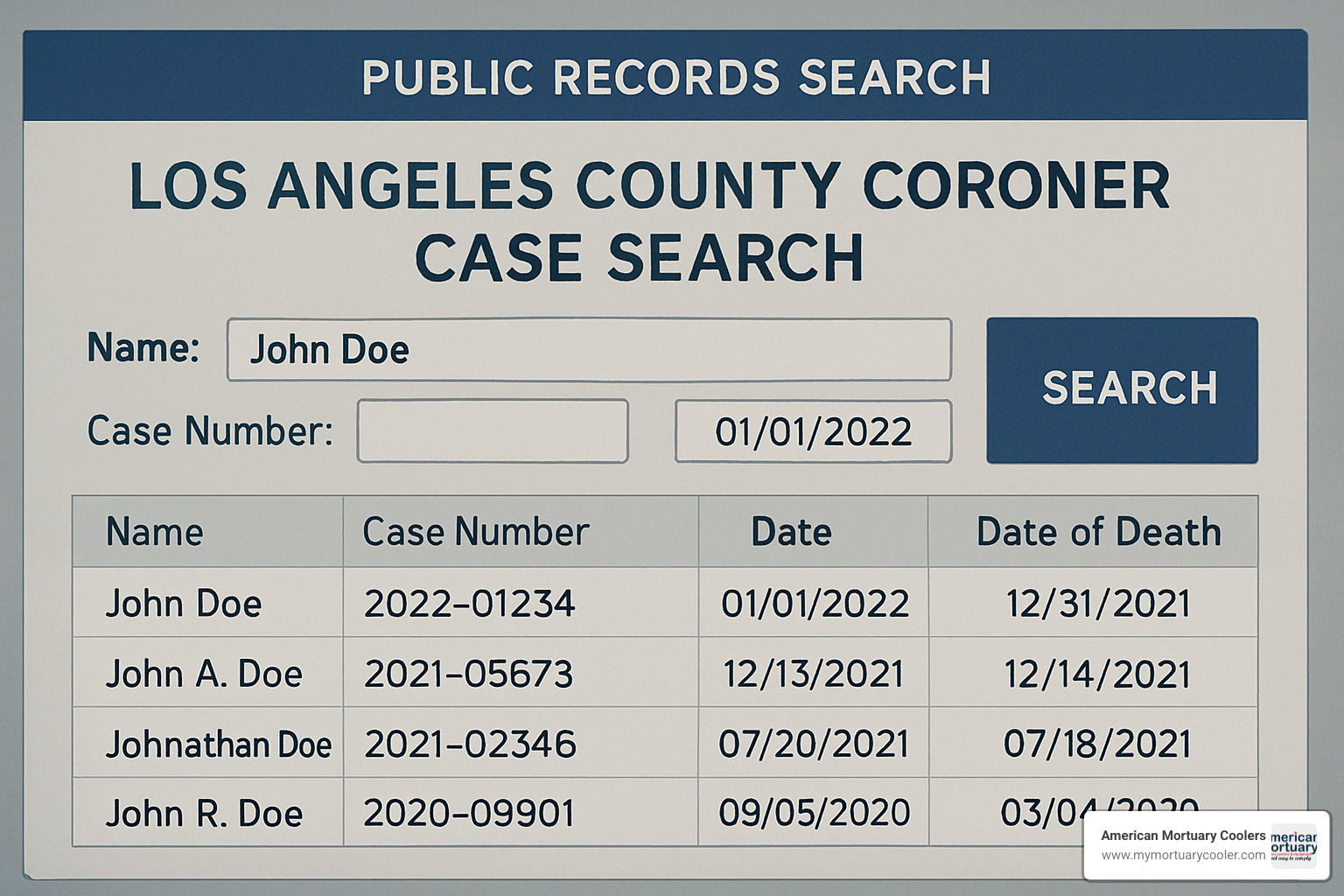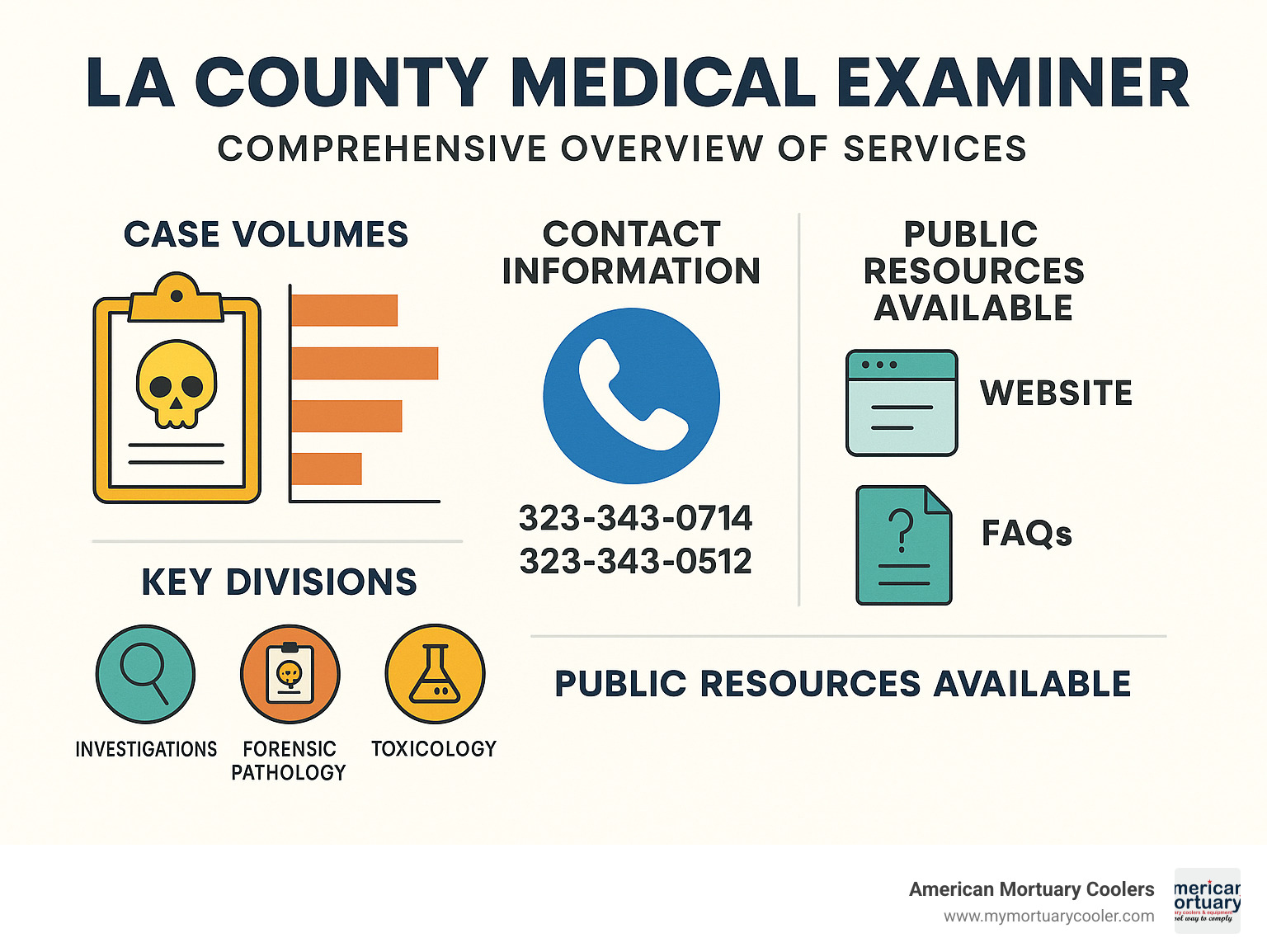
LA Coroner Uncovered – How to Access Services and Information
Understanding Los Angeles County's Medical Examiner Services
When you need information about coroner los angeles services, you're looking for the Los Angeles County Department of Medical Examiner - the agency that investigates approximately 10,000 deaths annually across the county's 88 cities and unincorporated areas.
Quick Contact Information:
- Address: 1104 N. Mission Road, Los Angeles, CA 90033
- Main Phone: 323.343.0512
- Records/Reports: 323.343.0513
- 24-Hour Intake: 323.343.0714
- Office Hours: Monday-Friday, 8:00am-5:00pm
- Website: me.lacounty.gov
Key Services Available:
- Case search and status updates
- Death reports and certificates
- Unidentified persons database
- Property claims for families
- Grief resources and support
The department changed its name from "Coroner" to "Medical Examiner" in 2023 to emphasize its independence from law enforcement and highlight the medical expertise required for forensic pathology. As Chief Medical Examiner Dr. Odey Ukpo stated during the rebrand: "The name change offers clarity in our identity, solidifying our independence..."
Whether you're a family member seeking information about a loved one, a legal professional requesting records, or a funeral director coordinating services, this guide covers everything you need to know about accessing LA County's death investigation services.
I'm Mortuary Cooler, a national-level mortuary cooler supplier who has worked extensively with coroner and medical examiner facilities across the country, including projects involving coroner los angeles operations and equipment needs.

Relevant articles related to coroner los angeles:
Why This Guide Matters
Understanding how to steer the coroner los angeles system is crucial for families dealing with unexpected loss, law enforcement officers, the legal community, and public health officials. We've created this comprehensive guide because navigating government services during times of grief shouldn't add unnecessary stress to already difficult situations.
Los Angeles County Department of Medical Examiner at a Glance
When people search for coroner los angeles, they're looking for one of the most sophisticated death investigation operations in the world. The Los Angeles County Department of Medical Examiner serves a massive population with a clear mission: providing independent, unbiased death investigations through advanced forensic science while treating every family with compassion and respect.
What makes this department unique is its complete autonomy from law enforcement. This independence ensures that every investigation focuses purely on scientific facts rather than investigative pressure. The department handles approximately 10,000 cases every year across all of Los Angeles County - that's roughly 27 death investigations starting every single day.
Main Responsibilities
The department's work includes thorough death investigations with scene documentation, witness interviews, and evidence collection. Autopsy services are performed by board-certified forensic pathologists to determine exactly how and why someone died. Toxicology analysis happens in advanced laboratories testing for drugs, poisons, and other substances. When disasters strike LA County, the department shifts into disaster response mode with specialized teams ready for mass casualty incidents.
Jurisdiction & Statistics
The coroner los angeles team investigates unattended deaths where no doctor was present, along with suspicious circumstances, accidents, suicides, and homicides. The headquarters at 1104 N Mission Road operates around the clock, with scene calls coming in 24/7/365.
Divisions & Facilities
The Investigations Division employs POST-certified peace officers who respond to death scenes and prepare detailed reports. The Forensic Medicine Division houses deputy medical examiners - forensic pathologists who perform autopsies and testify in court. Forensic Labs conduct toxicology testing, DNA analysis, and specialized examinations. The Identification Services division handles identifying unknown decedents through fingerprint analysis, dental comparisons, and DNA testing.
Coroner Los Angeles: History, Name Change & Leadership
The coroner los angeles office first opened in 1850 when Los Angeles was still a frontier town. The modern department took shape on December 17, 1920, during the city's rapid growth period. The office evolved into a hybrid system in 2013, adopting "Department of Medical Examiner-Coroner" before simplifying to "Department of Medical Examiner" in 2023.
From Coroner to Medical Examiner – Why the Change
Traditional coroners are often elected officials who may lack medical training and sometimes operate under sheriff's departments, creating potential conflicts of interest. Medical examiners must be physicians certified in forensic pathology who operate independently from law enforcement.
The LA County coroner rebrand represented a fundamental shift toward scientific independence. Chief Medical Examiner Dr. Odey Ukpo explained: "The name change offers clarity in our identity, solidifying our independence..."
Chiefs of the Office & "Coroner to the Stars"
Dr. Thomas Noguchi served from 1967 to 1982, earning the nickname "Coroner to the Stars" after conducting high-profile autopsies on celebrities including Marilyn Monroe, Robert F. Kennedy, and Natalie Wood. Dr. Odey C. Ukpo made history when appointed Chief Medical Examiner in March 2023, becoming the first African American to lead the department.
Impact on Public Perception
The rebranding emphasizes medical expertise over political connections and independence over law enforcement ties, helping rebuild public trust. Families can feel confident that investigations are conducted by qualified medical professionals without outside influence.
Inside an L.A. Death Investigation: Step-by-Step
When someone dies in Los Angeles County, the coroner los angeles system follows a careful, methodical process to uncover the truth. Every death investigation tells a story, and the department is committed to reading that story accurately.

Scene to Morgue
The investigation begins when law enforcement, hospital staff, or family members contact the Reporting Desk. Trained Coroner's Investigators - POST-certified peace officers - arrive at the scene within hours. They photograph everything, interview witnesses, and examine circumstances surrounding the death.
Property control becomes crucial, with investigators accounting for every personal item and maintaining a "chain of custody" paper trail. Once complete, the decedent is transported to the Forensic Science Center at 1104 North Mission Road.
Forensic Autopsy & Laboratory Analysis
A Deputy Medical Examiner decides whether a full autopsy is necessary. The forensic autopsy examines every organ system and documents injuries precisely. Toxicology testing analyzes blood, urine, and tissue samples for hundreds of different compounds - this sophisticated analysis often takes the longest time.
Timelines vary dramatically: straightforward natural deaths might be completed within 1-2 weeks, while suspicious deaths requiring extensive testing can take 2-6 months or longer.
Reporting & Records
After testing is complete, the pathologist determines cause of death and manner of death (natural, accident, suicide, homicide, or undetermined). They prepare the death certificate and detailed case reports. Next of kin notification happens as quickly as possible, ideally within 24 hours.
High-Profile Case Examples
The Aaron Carter case illustrates the thorough investigation process. When the singer was found on November 5, 2022, the investigation lasted over five months before determining drowning due to difluoroethane and alprazolam effects in April 2023. This timeline shows how complex toxicology cases require patience and precision.
Accessing Services & Resources: Case Search to "Skeletons in the Closet"
When you need to access coroner los angeles services, the department has developed multiple ways to help you get information during difficult times.
How to Obtain Coroner Reports
Getting official reports starts with calling the Records Service desk at 323.343.0513 during business hours. The department distinguishes between non-exempt documents (available to the public) and exempt documents (requiring subpoenas or legal authorization).
Turnaround times depend on complexity - simple requests might be processed within days, while complex cases can take weeks. Fees apply to most requests, though some exemptions exist. For detailed information, visit More info about report access.
Online Tools & Public Portals
The Case Search function lets you enter information to locate case records and track investigation status. The Unidentified Persons Database helps families searching for missing persons. The Transportation Fee Payment system allows online payment, though this fee is currently waived under a pilot program.

Unique Programs & Outreach
The "Skeletons in the Closet" merchandise shop is the only coroner's office in the world to operate such a program. Every dollar raised funds the department's drunk driving abatement program - turning tragedy into prevention.
Educational programs include occasional public tours and partnerships with schools and universities. For more insights into the department's operations, check out Showing the Silent Guardians.
Contact, Hours & Location
The main facility sits at 1104 N Mission Road, Los Angeles, CA 90033. Office hours run Monday through Friday, 8:00am to 5:00pm, with body release available Monday through Saturday, 12:00pm to 5:00pm.
Key phone lines:
- Main Office: 323.343.0512
- Records/Reports: 323.343.0513
- 24-Hour Intake: 323.343.0714
- Subpoena Desk: 323.343.0518
Collaboration, Training & Public Safety
The coroner los angeles system works with dozens of agencies throughout Southern California. These partnerships make the difference between isolated investigations and comprehensive public safety efforts.
Working With Coroner Los Angeles in the Field
Law enforcement agencies must notify the Medical Examiner immediately for any unnatural death. Officers preserve scenes, coordinate with investigators, and follow strict evidence protocols. Funeral directors work closely on body releases and transportation logistics. Courts and attorneys rely on expert testimony and detailed reports from Deputy Medical Examiners.
Staff Qualifications & Career Paths
The Chief Medical Examiner must be a physician certified by the American Board of Pathology in Forensic Pathology. Deputy Medical Examiners are board-certified forensic pathologists. Coroner's Investigators are certified California peace officers meeting POST standards. Laboratory personnel include toxicologists and DNA analysts with advanced scientific degrees.
Prevention & Public Health Initiatives
Overdose monitoring helps track dangerous drug trends before they become epidemics. Traffic fatality analysis identifies dangerous intersections and contributing factors. Homeless death analysis has revealed violence patterns, leading to improved protection efforts.
For more information about the department's public health efforts, check out Explore LADME.
Frequently Asked Questions about Coroner Los Angeles
What's the difference between a coroner and a medical examiner in LA County?
Traditional coroners are often elected officials who might not have medical backgrounds and sometimes work closely with sheriff's departments. Medical examiners must be licensed physicians with specialized training in forensic pathology - they've completed medical school, residency, and fellowship training specifically in death investigation.
LA County made this change in 2023 to emphasize the department's independence from law enforcement and commitment to scientific, unbiased investigations. This aligns with best practices in forensic science nationwide.
How can I get a copy of an autopsy or toxicology report?
Start by calling the Records Service desk at 323.343.0513 during business hours. The staff will ask for the case number and your relationship to the deceased. Not all information is immediately available - some details may be restricted for ongoing investigations or privacy laws.
Processing times vary significantly. Simple requests might be handled within days, while complex cases can take weeks. For media requests, email pio@coroner.lacounty.gov with the case number.
What happens to unidentified or unclaimed remains?
The department maintains a comprehensive Unidentified Persons database accessible through their website. Forensic specialists use multiple identification methods including fingerprint analysis, dental records, DNA testing, and facial reconstruction.
The identification process can take time - some cases resolve quickly while others remain open for months or years. When identification isn't immediately possible, remains are held for extended periods as investigators continue working with families and law enforcement to resolve cases.
Conclusion
The Los Angeles County Department of Medical Examiner stands as more than just a government agency - it's a cornerstone of justice and healing in our community. From its humble beginnings in 1850 to today's sophisticated forensic science center, the coroner los angeles system has continuously evolved to serve families during their most difficult moments.

The recent transition from "coroner" to "medical examiner" represents a commitment to transparency, scientific rigor, and independence that builds trust between the department and the community it serves. When Chief Medical Examiner Dr. Odey Ukpo speaks about "clarity in identity," he's talking about the promise that every investigation will be conducted with the highest professional standards.
For families navigating grief, understanding how to access these services can make an overwhelming situation more manageable. Whether you need a death certificate, want to check case status, or have questions about the investigation process, the department's various contact points and online resources provide multiple ways to get help.
The next steps are simple: If you need immediate assistance with a death investigation, call the 24-hour intake line. For general information, records requests, or case status updates, contact the main office during business hours. The staff at 1104 N Mission Road are there to help guide you through whatever process you're facing.
As American Mortuary Coolers, we've had the privilege of supporting forensic facilities across the country, including work that touches the coroner los angeles system. Our custom mortuary cooling solutions help maintain the precise environmental conditions these investigations require. It's our way of supporting the vital work that helps families find closure and communities find justice.
The specialized equipment that keeps this system running smoothly requires careful attention to detail. If you're in the funeral industry and want to learn more about the equipment that supports this critical work, we invite you to explore The Essential Guide to Morgue Coolers.
Every day, the Los Angeles County Department of Medical Examiner serves families, supports law enforcement, and contributes to public health and safety. Their work reminds us that even in death, dignity and truth matter. Whether you're seeking answers about a loved one or simply learning about these important services, know that this system exists to serve with professionalism, compassion, and scientific excellence.



